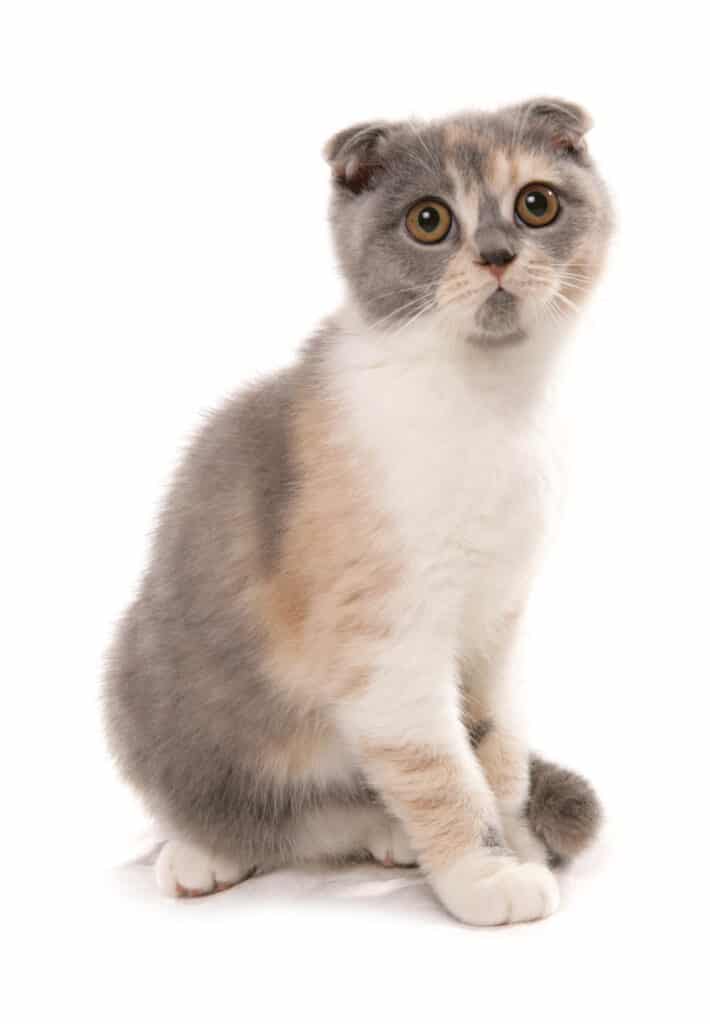Scottish Fold Cat
Felis catus
Scottish fold cats should never be bred together because of their genetic issues
Advertisement
Scottish Fold Cat Facts
- Prey
- Brids, fish, rodents
- Name Of Young
- Kittens
- Group Behavior
- Solitary
- Fun Fact
- Scottish fold cats should never be bred together because of their genetic issues
- Biggest Threat
- Health problems
- Most Distinctive Feature
- Small folded ears
- Gestation Period
- 65 days
- Training
- medium
- Age Of Independence
- 2 to 6 months
- Litter Size
- 1 to 12
- Diet
- Carnivore
- Lifestyle
- clowder
- Origin
- Scotland
- Slogan
- The cutest mutation in the animal kingdom
This post may contain affiliate links to our partners like Chewy, Amazon, and others. Purchasing through these helps us further the A-Z Animals mission to educate about the world's species.
View all of the Scottish Fold Cat images!
“The iconic tiny ears of Scottish fold cats are a genetic mutation that can lead to medical issues.”
5 Scottish Fold Cats Fun Facts
- Scottish fold cats are known for their unique ears; they are born with straight ears that fold down after the second month. Their ears come with either a single or double fold and feature a range of colors.
- They have a distinctive low meow, which is quite endearing.
- Scottish fold cats have low-maintenance coats that do not require frequent grooming.
- Although the breed originated in Scotland, nowadays these cats are more commonly found in North America and Japan.
- It is necessary to breed Scottish fold cats with other breeds to prevent genetic deformities.
Summary
Scottish fold cats are renowned for their unique folded ears, friendly personalities, and sociable natures. Originating in Scotland in the 1960s, this breed was initially bred as a farm cat to hunt and control rodents.
What makes them unique is their naturally folded ears, which give them their signature inquisitive appearance. This breed is an excellent choice for families who want a low-maintenance pet that is affectionate and loyal.
With their gentle nature and outgoing personalities, Scottish fold cats make wonderful companions.
Three Pros and Cons of Owning a Scottish Fold Cat
The Scottish fold cat is renowned for its engaging, affectionate personality and adorable folded ears, making it a popular breed for cat lovers. However, like any pet, there are pros and cons to having a Scottish fold as part of your family. Here are three of the most significant advantages and disadvantages of owning a Scottish fold cat.
| Pros | Cons |
|---|---|
| Affectionate Nature – Scottish folds are well known for their sweet, endearing personalities. They are happy to cuddle up with their humans and often follow them around the house seeking attention. | Prone to Health Problems – Scottish folds are known to be prone to certain genetic health problems, such as polycystic kidney disease. It is crucial to work closely with your vet to keep them in good health. |
| Low Maintenance – Scottish folds don’t require much grooming, so they are relatively low-maintenance cats. Regular brushing and nail clipping are all that is needed. | Prone to Inactivity – Scottish folds love to lay around the house. If you are looking for a more active pet, then this breed may not be ideal. |
| Low Shedding – Scottish folds have relatively short fur, which means they are not major shedders. This makes them ideal for pet owners who don’t want to deal with a lot of fur. | Prone to Ear Infections – Scottish folds are more susceptible to ear infections due to their folded ears. It is important to take them for regular vet checkups to ensure their ears remain healthy. |
Scottish Fold Cats Size and Weight
The Scottish fold cat is a medium-sized feline companion with a unique folded ear feature. They have a thick-boned, stocky build and are known for their round faces and wide-set eyes. Despite their size, these cats are surprisingly agile and can easily jump to high places.
| Height (Male) | 8-12 inches |
| Height (Female) | 8-10 inches |
| Weight (male) | 8-13 pounds |
| Weight (female) | 6-8 pounds |
The Best Food for Scottish Fold Cats
As with any pet, it is vital to feed your Scottish fold cat a healthy and balanced diet. A high-quality diet rich in protein and fatty acids is essential for the health and well-being of your pet cat. Some good choices for their diet include a mixture of wet and dry food and possibly even a raw diet for pet owners who don’t mind the challenge. Additionally, you should provide them with plenty of fresh water throughout the day to keep them hydrated.
Our recommendation for the best cat food for Scottish fold cats is Taste of the Wild Grain-Free Dry Cat Food. This dry food contains roasted venison and smoked salmon and is fortified with vitamins and minerals to give your Scottish fold cat all the necessary nutrients it will need.
- Contains mix of venison and salmon meat
- Contains fruits, vegetables, minerals, and vitamins
- Easily digestible
- Boost the immune system
Common Health Issues for Scottish Fold Cats
This breed is prone to obesity due to their lack of activity. The breed is also commonly susceptible to certain genetic health problems, such as polycystic kidney disease and hip dysplasia.
Additionally, their cute, folded ears can cause problems like ear infections or general pain. It is important to monitor your cat’s health closely and take them for regular vet checkups to ensure they remain healthy and happy.
Scottish Fold Cats Temperament
Scottish fold cats are known for their unique personality and sweet and affectionate behavior. They love to be around their owners and will often seek out attention. They are generally quiet cats but may become vocal if they feel ignored, neglected, or simply want a scratch. These cats have inquisitive behavior and are often willing to explore new places.
They have an independent nature, so you don’t need to worry about them being overly clingy. Like most breeds of cats, they will groom themselves and spend most of the day lounging alone. Despite their relatively low activity level, they can still be playful and enjoy playing with toys or chasing a ball around the house.
These playful traits, combined with their calm behavior, make them an ideal family pet.
How To Take Care of Scottish Fold Cats
These cats are adorable with their distinctive folding ears and big eyes and they’re sure to capture hearts. Taking care of your Scottish fold cat is relatively straightforward. As with any pet, it requires a lot of love, attention, and care.
Maintenance and Grooming
Pet owners should stay consistent with their cat’s grooming routine. Regular brushing will help reduce shedding and keep the fur healthy and clean. It’s also important to check your pet’s eyes and ears regularly. While Scottish fold cats have fewer allergens than some other cat breeds, they are not hypoallergenic.
Make sure to trim your cat’s nails as well since long nails can be uncomfortable and cause pain.
Training
These are intelligent felines that can easily learn a few tricks. If pet owners start training their Scottish fold cats early, they will quickly learn how to sit and come when called. Training your pet can also help reduce destructive behavior like scratching furniture or jumping on counters.
Exercise
Like other breeds, Scottish fold cats need regular exercise to stay healthy. Providing toys and scratching posts will help keep your pet entertained and active. Playing with your pet is also a great way to bond with them and increase their physical activity.
Kittens

Clear boundaries have to be established with Scottish fold kittens to create a well-mannered pet.
©christbrignell/Shutterstock.com
When raising a Scottish fold kitten, it’s essential to give them extra attention and care. You should socialize them early to help them adjust to new environments and people. Clear boundaries have to be established early on, as well as a consistent routine, to create a well-mannered pet.
You will also need to ensure that your kitten eats a nutritious diet as they grow. Their diet plays a significant role in their development. So, provide them with high protein and low carbohydrate foods to ensure they get the necessary vitamins and minerals.
With the right care, your Scottish fold cat will be a happy, healthy, and well-mannered companion for you and your family.
Scottish Fold and Children
The Scottish fold is known to be very gentle and patient, making them a great companion for children. They tend to have easygoing personalities and are loyal to their family. These cats are also known to be quite affectionate, so they make great pets for families with young children.
However, it’s important to remember that you should supervise any cat around young children. Ensure that kids are taught how to interact with the cat appropriately and continually monitor them when they play together. Small children may play too rough and hurt the Scottish fold, or the cat may scratch the child.
Cats Similar to the Scottish Fold
Scottish folds are adorable, but unfortunately, due to their genetic abnormalities, they need to either be mixed with other breeds or not bred at all. Otherwise, the breed will have many health issues that can cause the cat to suffer.
If you’re looking for a cat similar to the Scottish fold, consider breeds like the British shorthair, Maine coon, and American curl. All of these cat breeds have similar personalities, grooming requirements, and exercise needs. They also share the same sweet, calm nature that the Scottish fold is known for.
Popular Names
If you’re struggling to come up with a good name for your Scottish fold, here are some of the most popular choices:
- Minnie
- Max
- Domino
- Midnight
- Tiger
- Ace
- Scout
- Milo
- Leo
- Daisy
Related Animals
View all 293 animals that start with SScottish Fold Cat FAQs (Frequently Asked Questions)
How much do Scottish fold cats cost?
The average cost of owning a Scottish fold cat can vary greatly depending on the breeder, the cat’s age, and its health. Generally, you can expect to pay between $400 and $2,000.
This price usually includes the cost of vaccinations, spay/neuter surgery, and other necessary vet care.
Are Scottish fold cats good with kids?
Yes, the Scottish fold cat is known to be very gentle and patient. They tend to have easygoing personalities and are loyal to their family. These cats are also known to be quite affectionate, so they make great pets for families with young children.
How long does a Scottish fold cat live?
The average lifespan of a Scottish Fold cat is between 12 and 15 years. With proper nutrition, veterinary care, and exercise, some cats may live longer.
Do Scottish fold cats shed?
Yes, the Scottish fold cat is an average shedder. Brush your pet regularly to reduce the amount of shedding and keep their coat healthy. Providing them with high-quality food and plenty of exercise also helps keep their fur looking its best.
Are Scottish fold cats hypoallergenic?
No, Scottish fold cats are not hypoallergenic. While they do produce fewer allergens than some other breeds of cats, they still shed regularly, and their dander can still be an issue for those with allergies.
Do Scottish fold cats have health problems?
Yes, Scottish fold cats have several genetic abnormalities that can cause severe health issues. This can be everything from internal issues in their kidneys to ear infections or general pain. This is why it is recommended that these cats are bred with other cat breeds.
Thank you for reading! Have some feedback for us? Contact the AZ Animals editorial team.
Sources
- Walkerville Vet, Available here: https://www.walkervillevet.com.au/blog/scottish-fold-health-problems/
- Petotum, Available here: https://www.petotum.com/blog/scottish-fold-cat
- Hills Pet, Available here: https://www.hillspet.com/cat-care/cat-breeds/scottish-fold

















